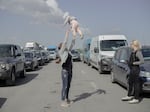
Ukrainians wait in a miles-long jam full of trucks, buses and cars to cross to the border at Medyka, Poland.
Adam Lach for NPR
Medyka, Poland is a quiet and idyllic farming village near the southeastern border with Ukraine.
But in recent months, it has become the busiest border crossing for Ukrainian refugees since the war with Russia began in late February.
In February and March, refugees waited for hours or days there to cross into Poland. Now, the flow has reversed. The long lines are on the Polish side of the border filled with people waiting to cross into Ukraine.
Anna Kobernyk and her friends have been waiting in a van for six hours, parked in a line of vehicles almost 10 miles long.

Anna Kobernyk waits in van at the Poland-Ukraine border.
Adam Lach for NPR
"We were waiting all night here and all of us are really tired," she says.
Kobernyk is a graduate student from Kyiv getting a masters in International Relations. Over the last few months, this war has given her a crash course.
"It is my practical lesson. It's sad, of course. That actually the 21st Century is not so fantastic. That U.N. and many, many others, all of them can do nothing," Kobernyk says.
Weeks after the war began, the Medyka border crossing was filled with refugees leaving Ukraine. People wept, afraid that they were departing their country forever, not knowing if they would even have a country to return to.
Now, even though there is still death and fighting in Ukraine's south and east, the scene here at the Polish border has lost the panic and fear it once had.

After almost three months since the war began, families are returning through the Poland-Ukraine border in Medyka.
Adam Lach for NPR
Some Ukrainians are going back and forth often.
And the tears these days are often from happy reunions. Parents like Oksana Chikh hug their kids at this border crossing for the first time in months.
"I haven't seen them since the beginning of the war," Chikh says. " We drove our children to the border on Feb 26."
Chikh and her husband are both police officers in the city of Ivano-Frankivsk. They weren't allowed to leave Ukraine when the war started, so she sent her three boys to safety in Poland with their grandmother.
"I was scared, it was painful. But most importantly, uncertain," she says. "When you don't know when you'll return, you don't know what to expect. This uncertainty is the most frightening."
Her sons are 6, 9, and 11. The family stands in a long line of pedestrians waiting to enter Ukraine. The 9-year-old says he can't wait to get back home to Ukraine and play with the cat he hasn't seen since February. His mother's hands keep touching the boys' shoulders as she talks.
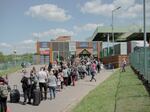
The war hasn't ended, but the number of Ukrainians crossing back into the country has grown.
Adam Lach for NPR
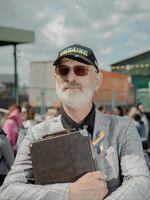
Yuri Vasylevych, 71, waits with his saxophone at the Poland-Ukraine border to cross to the Ukrainian side.
Adam Lach for NPR
When there's a war on one side of the border, separations and reunions can have much higher stakes. Because although the family's home in Ukraine is peaceful, areas in the country's south and east are still under heavy Russian assault.
Still, on this day at the Medyka border crossing, more people like Yuri Vasylevych are going back to Ukraine rather than entering Poland.
Vasylevych stands alone in the line, holding a saxophone case. Today is his 71st birthday.
While most of the people waiting to cross wear hoodies or T-shirts, he's smartly dressed in a plaid blazer over a black polo shirt. As a senior citizen, restrictions on men of military age leaving Ukraine don't apply to him. He's just returning from a four-day conference of European saxophonists, where he was a special honored Ukrainian guest.
"The thing is, music comes from the heart. It informs one's entire attitude," he says. "It's health, it's life. We are all born with music and we are going through life with music.
The giddiness in Vasylevych's voice is not just from people eager to reunite with family members.
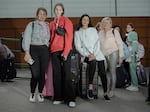
Snizhana Khomenko, Veronica Naboka, Violetta Naboka and their friend wait to cross the border.
Adam Lach for NPR
Violetta Naboka and her 14-year-old daughter have spent the last two months living with Polish strangers who, she says, treated them like family.

Anastasia Boryko waits at the Poland-Ukraine border to cross.
Adam Lach for NPR
"These people really love Ukraine," she says. "I'm very happy because I really want to [return] to my house, to my husband, to my mother, to my dog Brooklyn."
This crossing no longer feels like a fork in life where there's no turning back.
On the vehicle path of the border, double-decker buses idle bumper to bumper, waiting for the border guard to signal when it's their turn to cross the border.
The signs on their dashboards say they've begun their journeys in Poland, Germany, Italy, and places even farther west.
Some of the destination cities are Kyiv, Lviv, and Ivano-Frankivsk — all in Ukraine.
"It's a very strange feeling because when we left we were very scared, we were escaping," says bus passenger Anastasia Boryko.
Boryko first evacuated from Ukraine to Poland in early March. Now, she's crossed a few times.
In the Ukrainian city of Rivne, her life working as a marketing manager feels almost normal. She remembers what it feels like to be home.
"At the morning when the sun starts rising and we are at Lutsk and I saw the people, I saw streets that I know," she says. "That was very good. That was like, yay, I'm home."
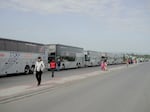
Buses line up to take Ukrainians back over the border and home.
Adam Lach for NPR

Roman Makar passes the time until he can cross the border.
Adam Lach for NPR
It's not just passenger vehicles and buses waiting to cross the border into Ukraine. The line of commercial trucks is also far longer than it used to be, because this is one of the few ways anything can get into Ukraine these days.
"Sometimes we're here 48 hours," says a trucker named Roman Makar. "Because all of the transport into Ukraine is now made by land, not air."
The airport in Kyiv is closed. So is the seaport in Mariupol.
Makar has been a truck driver since 2000, and he's never seen the crossing this packed. Long days and nights in his truck have encouraged him to transform his truck into a cozy space where he can spend his time.
"My talisman," he says, holding up two stuffed animals: a fuzzy turtle and teddy bear that sit on the dashboard next to an "I love Ukraine" flag.
"This is my home," he says. And he doesn't just mean the cab of the truck. Ukraine is also his home.
This thin, weathered man with silver eyes sits in the cab with his shoes off, knee tucked up into his chest. Even for someone like him who goes back and forth all the time, driving into Ukraine carries an emotional weight. He puts his hand over his heart.
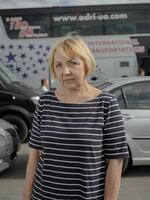
Victoria Olanych waits to cross the border.
Adam Lach for NPR
"My wife and kids still live there," he says.
Any border can be a place of sudden transformation. Yet everything here creeps slowly, inching towards the line that divides a country at peace from one that's under attack.
Victoria Olanych hasn't set foot in Ukraine since before the war. And the idea of returning overwhelms her.
"I go now to my mother, visit my mother because she's very ill," Olanych says. "She's laying in hospital, and I don't have hope."
Olanych moved to Brussels in 1989. Going back home is very painful, she says.
To pass the time on this long journey, she's been chatting with others on her bus.
"I ask them, they say, 'I don't find myself in Germany, I don't find myself in Belgium.' Mostly, people want to go back," she says. "They love Ukraine."
Without warning, her bus' engine turns on, the doors begin to close, Olanych runs toward it, waving and also crying, climbing back onto the bus as it slowly rolls closer to her homeland.
Copyright 2022 NPR. To see more, visit https://www.npr.org.
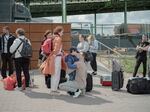
A family says their goodbyes to those returning to Ukraine.
Adam Lach for NPR